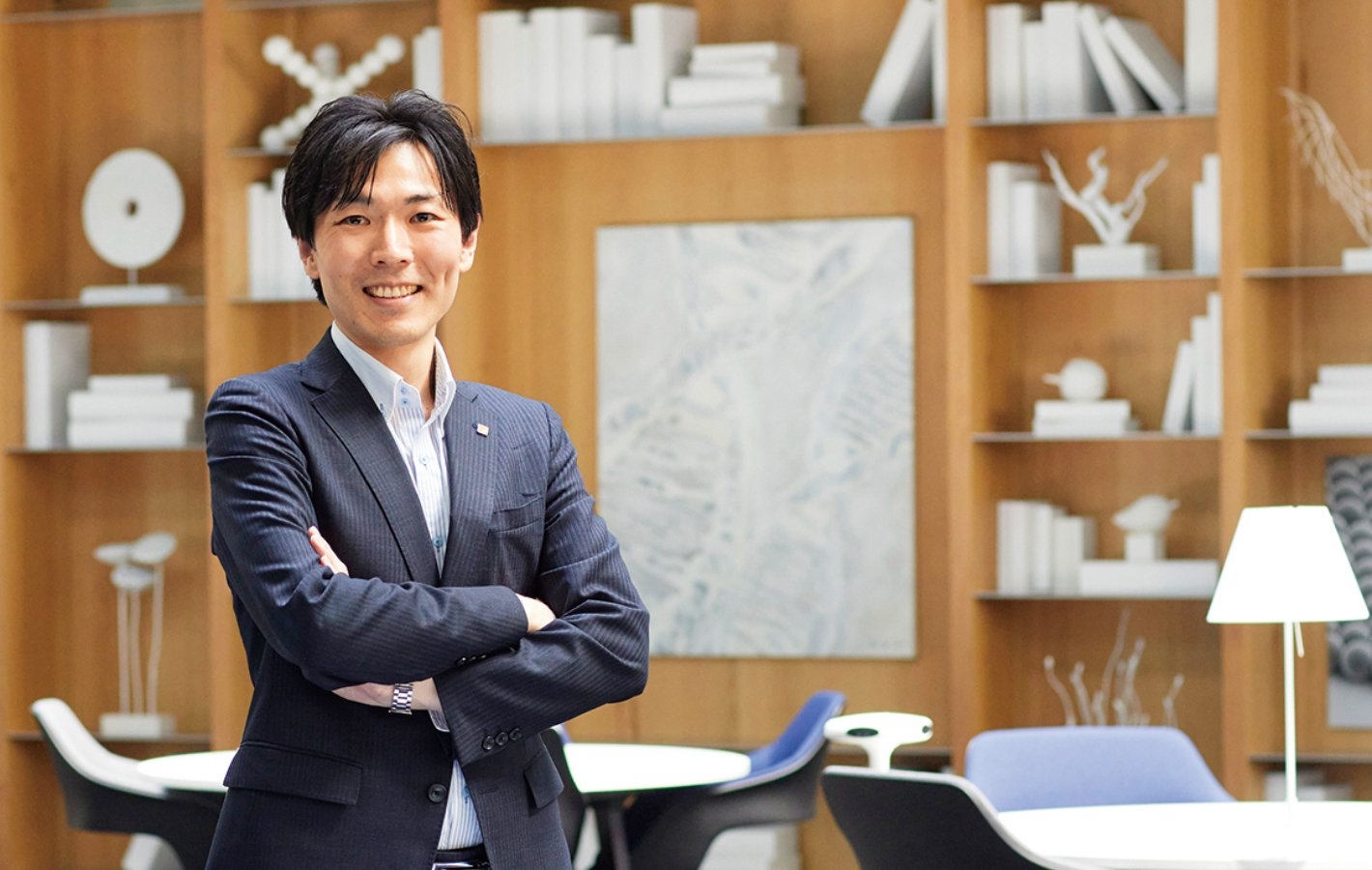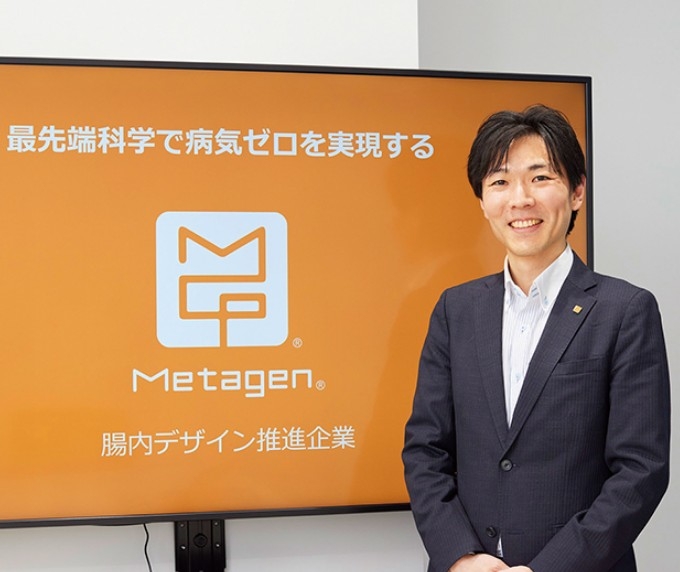While attending technical college, learned about the "2010 problem" advocating the danger of patients with intractable diseases being left behind, and decided to help people through craftsmanship
Prospective Students
Tokyo Institute of Technology merged with Tokyo Medical and Dental University to form Institute of Science Tokyo (Science Tokyo) on October 1, 2024.
Over time, content on this site will be migrated to the Science Tokyo Web. Any information published on this site will be valid in relation to Science Tokyo.

Prospective Students

Metagen Inc. Director CFO
Doctor of Engineering
Taking on next-generation health care based on his experience as a student entrepreneur, researcher, and exchange student
Although we hear the phrase "regulate your gut environment" in advertisements and other media on a daily basis, it is still not widely known that personalized healthcare for the gut environment can actually help achieve a Zero-Disease Society in which everyone remains healthy. Based on the belief that craftsmanship can save people, Dr. Yoshinori Mizuguchi, who conducted research at Tokyo Tech and is currently the CFO of Metagen, is at the forefront of gut environment research at the company. He looked back on his seven years of intense research, as well as the dual challenge of starting his own business while he was a student. He also talked about the invaluable experiences that have made him who he is today.
I decided that I wanted to contribute to the world through life science research when I read the book Iyakuhin kuraisisu: 78 cho-en shijo no gekishin [Pharmaceutical Crisis: The 78 Trillion Yen Market Shock] by Kentaro Sato while I was a student at a technical college. The "2010 problem" discussed in the book refers to a social issue, the concern that patents for major pharmaceuticals would expire simultaneously around the 2010 period, severely affecting the earnings of various pharmaceutical manufacturers. I realized then for the first time that if profits were to fall, it would make it even more difficult to fund the development of drugs for intractable diseases, which are already technically difficult to create, and patients with intractable diseases would be left behind. It is not that I did not consider going into medicine from the perspective of treating sick people, but since I have always loved making things, I decided to help people by creating new things myself. It was with the "2010 problem" in mind that I took up the challenge of researching nucleic acid drugs early in my technical college stage, which at the time were gradually attracting interest as a means for new drug discovery technology.
After graduating from a technical college, in order to further deepen my research, I transferred to the Department of Bioscience in the School of Bioscience and Biotechnology at the Tokyo Institute of Technology that offer an engineering approach to the field of biology. During my undergraduate studies, I mainly studied bioinformatics, which is the use of computers to analyze information held by biomolecules, including genomes, to improve related aspects of life and medicine. From the fourth year of the bachelor's degree program, I became a member of the Eiry Kobatake Laboratory, where I immersed myself in research to develop technologies that will lead to regenerative medicine. The drugs available on the market are more about suppressing the symptoms of diseases, and I was attracted to regenerative medicine because of its potential to cure the root cause of diseases.

After graduating from the bachelor's degree program, I entered the master's program at the Graduate School of Bioscience and Biotechnology at Tokyo Tech, and at the same time, I joined the Education Academy of Computational Life Sciences (ACLS). This was an initiative adopted by the Ministry of Education, Culture, Sports, Science and Technology (MEXT) as a Program for Leading Graduate Schools. I decided to enroll in the program because I felt it would help me realize my dreams, as I would be able to study life science, my specialty, as well as informatics, while interacting with students of the same grade and people from the industry, and also receive an incentive grant.
A major turning point in my life was an industry internship as part of the ACLS program. In 2013, when I was a first-year master's student, I participated with my ACLS colleagues in a business contest for which the company sponsoring the internship was calling for entries. We came up with the idea of a “smart toilet” that would analyze personal health information from the gut bacteria found in stool, but the result was unsuccessful. The following year, we were again unsuccessful in our re-entry, but through an introduction by the organizer, we met Dr. Shinji Fukuda, a researcher of the gut environment. At the same time, we started discussions with Dr. Takuji Yamada, a faculty member of the same graduate school and an expert in bioinformatics. After hitting it off with the professors, I decided to enter the Bioscience Grand Prix, this time specializing in health care. Finally, we were able to win the Grand Prix in 2015. The following month, my ACLS colleagues and I also won the top prize in the Edge Innovation Challenge Competition 2015, an idea competition sponsored by the MEXT. Through these experiences, I had stimulating discussions with like-minded colleagues, which led me to found Metagen in March of the same year, together with Dr. Fukuda, Dr. Yamada, and my classmates.
I was in the second year of the master's degree program and started my own business without much hesitation, despite needing to balance it with schoolwork. Looking back, I feel that I would have decided to start a business sooner or later because I had the feeling that unless researchers implement the results of their research in the real world themselves, they would not be able to change society directly. Also, after the various encounters, I just couldn't resist the urge to test out my ideas then. Of course, it was not a simple task, especially when I was simultaneously engaged in three things: doctoral research, running a company, and studying abroad (a requirement), but I made good use of my time and overcame the difficulties. I chose the Cancer Science Institute (CSI) at the National University of Singapore (NUS), where the time difference from Japan is relatively small. I checked my work e-mail during spare time when I was doing bio experiments such as electrophoresis in the lab, and worked on my doctoral dissertation when traveling to meetings. I was clueless about running a company, but I steadily accumulated knowledge piece by piece, studying on the fly.

I was the company's Chief Operating Officer (COO) to oversee sales activities when the company was first established, Chief Strategy Officer (CSO) to manage business strategy after completing my doctoral studies, and Chief Financial Officer (CFO) to handle finance since 2020, changing my role as the company grew. Other activities outside the company include taking part in the Industrial Structure Council by the Ministry of Economy, Trade and Industry in 2020 as a manager of a venture company and making proposals for policies to promote the success of young talent. Currently, as a member of the Committee on Human Resources of the MEXT, I am taking part in discussions aimed at creating a society in which Ph.D. holders can play a more active role.
The Metagen Group has set its sights on a Zero-Disease Society as its ultimate goal through a two-pronged approach: Metagen, which provides health care based on the gut environment, and Metagen Therapeutics, which undertakes medical drug discovery projects. To make progress toward this goal, we are promoting real world implementation of research results on the gut environments. The gut microbiota is the collection of bacteria in the gut, the "additional organ®" that greatly affects people's health. Improving the gut environment is an urgent issue, but the gut environment is unique and dependent on dietary and lifestyle habits, and requires an individualized approach. Therefore, I believe that appropriate application of information on gut bacteria and metabolites in stool will be an important component in building the healthy society of the future.
In addition, in order to return the fruit of research results to society, a variety of stakeholders, including food companies and material manufacturers, must be involved. We run the Gut Design Project, a community for corporate collaboration, where companies that share the Gut Design® philosophy are working together to create a new market. In fact, in April of this year, in cooperation with Calbee, Inc., we were able to launch Body Granola, a granola subscription service that allows individuals to select ingredients based on their own gut environment. As we aim for a Zero-Disease Society, we want to create a society where 100% of people are healthy, so it is a big step for us to be able to offer a product that lets individuals choose based on their gut environment. With an eye on the future 100 years from now, we will continue to uncover insights with an insatiable spirit of inquiry and pass the baton to the next generation.
While attending technical college, learned about the "2010 problem" advocating the danger of patients with intractable diseases being left behind, and decided to help people through craftsmanship
Transferred to the bachelor's degree program at the Department of Bioscience, School of Bioscience and Biotechnology, Tokyo Institute of Technology. Working on research and development of technology that will lead to regenerative medicine in the Kobatake Laboratory
Enrolled in the master's degree program at the Graduate School of Bioscience and Biotechnology, Tokyo Tech. At the same time, joined the Education Academy of Computational Life Sciences (ACLS), where he studied informatics in addition to life science until the completion of his doctoral studies
Winner in the Bioscience Grand Prix. Started Metagen with people he met through competitions and became Director COO
Completed his doctorate at the Department of Biological Information, Graduate School of Bioscience and Biotechnology, Tokyo Tech. Appointed as Director CSO of Metagen. Appointed CFO in 2020
Launched Body Granola, a product jointly developed with Calbee. Aiming to promote health care products that suit the individual's gut environment

Yoshinori Mizuguchi
Profile
In 2013, he graduated from the Biological Information Course, Department of Bioscience, School of Bioscience and Biotechnology, Tokyo Institute of Technology, and entered the Graduate School of Bioscience and Biotechnology at Tokyo Tech. In 2015, he founded Metagen while working for five years at Tokyo Tech's Education Academy of Computational Life Sciences. After completing his Ph.D. in 2018, he now serves as the company's CFO and leads the company toward achieving his vision of a Zero-Disease Society.
School of Life Science and Technology
—Unravel the Complex and Diverse Phenomena of Life—
Information on School of Life Science and Technology inaugurated in April 2016
The Special Topics component of the Tokyo Tech Website shines a spotlight on recent developments in research and education, achievements of its community members, and special events and news from the Institute.
Past features can be viewed in the Special Topics Gallery.
Interview held on May 16, 2023 at the Laboratory of Metagen Inc., Kawasaki Office